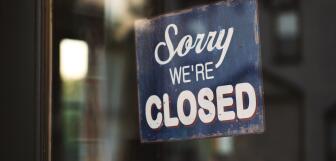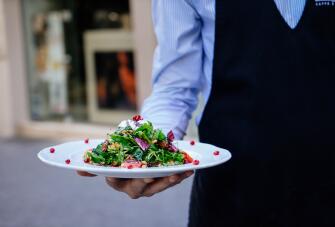Why Do So Many Hospitality Businesses Fail?
Many people are reluctant to enter into the hospitality industry when starting a new business. It is common knowledge that hospitality is a tough industry to succeed in. 60% of these businesses do not make it past the first year and 80% go under in five years, which is 10% above the normal business failure rate. There are a number of reasons for this, including having a lack of an original concept, knowledge of costings, bad quality food, or issues with customer service.
Dollars and advertising
Many businesses fail at the first hurdle by not having enough capital behind them when they start their business. This is actually the most commonly cited reason for restaurant failure. When entrepreneurs attempt to start-up their venture with low capital, sometimes it is only just enough for them to open their doors and it is nowhere near enough to keep them going during the first potentially slow months. Another problem with having a lack of funds is that it is unlikely there would be enough money to invest in marketing for the new business, which is absolutely key for a new business to get ahead.
There are many ways that a new restaurant, cafe, or bar can be advertised and some are more effective than others. Make sure your marketing is appropriate for your industry and experiment with different forms of marketing to find the most successful and that gives you the most return.
For example, you can include discount codes to quote upon booking so you know which customers have seen a particular advertisement. Successfully developing and maintaining customer interest is vital to having a successful business and product. A solid marketing and advertising campaign will create steady customer flow, but keep in mind that it is up to your team to ensure that customers come back again.
Chain businesses are constantly opening, and you will be competing with established businesses with a lot of funding behind them. The reputation you build yourself will become based on the quality of your food or drinks, your staff and service, atmosphere, and the venue itself.
It is common for new businesses to open up their restaurant or bar with too little staff, too many staff, or with a team of people who lack experience. Many people assume that more staff means better service but in fact, a small team of efficient and enthusiastic staff can be much more beneficial than having a large team of demotivated and clueless individuals.
Make sure your team shares your passion for making the business succeed and educate them on food/drinks so they can answer customer questions without hesitation. While over staffing can lead to profit losses, lack of staff can result in a bad customer experience, which can also impact your profits as it is less likely that customers will return. Make sure you get the balance right for your business!
Bad customer service/quality of product
Customer service, along with good food/drinks, is integral to staying open. A great way to gather customer feedback is in the form of comment cards. You can also operate a loyalty program to encourage customers back.
It is said that for every customer complaint that you receive there are usually three more that are left unsaid, and it is possible that they will leave a bad review online, which potential customers could see or they will tell friends and family. This may result in a large number of people avoiding your business in the future and have a negative impact on footfall and profits. Bad experiences are much more likely to crop on review sites and people are very fast to criticise new businesses.
Not only do you need to make sure the quality of your product is high, but you also need to make sure it is consistent. You know what they say… “If it ain't broke, don't fix it”...If you have a good recipe or dish that customers love, why change it?
It is important to remember that many customers will refuse to pay for items that they are not happy with. If you are giving free drinks or meals away, this can have a huge impact on your profit margin and make it much harder for you to succeed in the hospitality industry, especially if you are up against similar chain businesses.
Costs
It is crucial that you have an in-depth understanding of your costs, including what you are buying your products for and the markup for each one. Knowing how to correctly price your food or drinks menu is the first step towards making a profit.
Keep your prices competitive without substituting your quality but allow yourself a decent profit margin to ensure every sale is beneficial for you. Successful restaurant owners set the price of a product as a direct relationship to the cost to them of making that product. The golden rule of a 30% markup will help you to keep menu prices in line.
Most failed restaurants had labor and food costs that exceeded 60% of revenues which indicated a greater potential for failure. Profitability analysis and stock control is an important task for any manager or owner of a hospitality business.
Many businesses waste time and money carrying out laborious stock takes when in fact you can use a POS system that will do all of this for you and can even re-order items you are running low on. You can save money and time, prevent theft, and reduce unnecessary costs. On average, it is said that 20% of bar sales a month are due to theft, free drinks, spilled drinks, and other expenses like inconsistent portion sizes.
Lack of Original Ideas or Branding
What can your business offer customers that sets you apart? Original ideas can create buzz and will ensure customers visit you and not your competitors. It doesn’t have to be the food or drinks you serve that make you different from your competitors, it could be the service you give, the atmosphere or experience that you create.
Typically restaurant names have 13 letters and an undescriptive name any longer than this has been shown to be less likely to succeed than a brief yet descriptive name. Make sure your restaurant and brand stand out from the crowd.
There are important factors that should be considered when branding your hospitality business, including product, people, promotion, and place. With so much choice of restaurants, bars, and cafes it means that there is plenty of competition for business. It has been found that a brand concept that is not differentiated is one of the prime reasons for restaurant failure.
Bad Location
A bad location is one of the biggest (if not THE biggest) reason for a business to fail. You need to bear in mind potential competition, visibility, parking, and the foot traffic of the area when you are considering a location for your business.
At the same time, it is important that you find a location that you can afford. Paying unrealistically high prices for a prime location can also result in failure as you are unable to achieve the revenue to make it worth your while. Research suggests that your rent, lease, or mortgage should be no more than 7-9% of your revenue.
Opening a restaurant business in an already saturated market means that it is very unlikely to succeed. If there are too many restaurants and not enough customers it is a disaster waiting to happen. Studies suggest failure rates are much higher in areas with a high concentration of restaurants. Be very careful to check that the market/local area you are entering has a gap for you!
Finally...
If your business faces any of the problems that have been discussed, don’t panic just yet! Some establishments experience a few of the above factors but still grow into successful businesses. Great marketing and a good product can ensure that your new business succeeds.
However, it is important to note that if businesses were able to avoid these commonly made mistakes then they would be able to operate much more successfully and it would be more likely that the business would generate significantly more profit. When you are able to recognise a problem within your business it is important you take action immediately action to avoid them getting worse.



